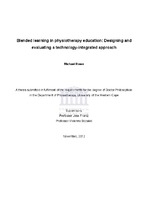| dc.description.abstract | Background: Practice knowledge exists as a complex relationship between questions and answers in a context of meaning that is often intuitive and hidden from the novice practitioner. Physiotherapy education, which aims to develop patterns of thinking, reflection and reasoning as part of practice knowledge, is often based on didactic teaching methods that emphasise the learning of facts without highlighting the relationships between them. In order to improve health outcomes for patients, clinical educators must consider redesigning the curriculum to take into account the changing and complex nature of physiotherapy education. There is some evidence that a blended approach to teaching and learning may facilitate the development of graduates who are more capable of reflection, reasoning and critical thinking, and who can adapt and respond to the complex clinical environment. The purpose of this study was to develop principles that could be used to guide the design of blended learning environments that aim to develop capability in undergraduate physiotherapy students. Method: The study took place in a university physiotherapy department in the Western Cape in South Africa, among undergraduate students. Design research was used as a framework to guide the study, and included a range of research methods as part of that process. The problem was identified using a systematic review of the literature and a survey of students. The design of the blended intervention that aimed to address the problem was informed by a narrative review of theoretical frameworks, two pilot studies that evaluated different aspects of blended learning, and a Delphi study. This process led to the development of a set of design principles which were used to inform the blended intervention, which was implemented and evaluated during 2012. Results: The final results showed that students had undergone a transformation in how they thought about the process and practice of learning as part of physiotherapy education, demonstrating critical approaches towards knowledge, the profession and authority. These changes were brought about by changing teaching and learning practices that were informed by the design principles in the preliminary phases of the project. These principles emphasised the use of technology to interact, articulate understanding, build relationships, embrace complexity, encourage creativity, stimulate reflection, acknowledge emotion, enhance flexibility and immerse students in the learning space. Discussion: While clinical education is a complex undertaking with many challenges, evidence presented in this study demonstrates that the development of clinical reasoning, critical thinking and reflection can be enhanced through the intentional use of technology as part of a blended approach to teaching and learning. The design principles offer clinical educators a framework upon which to construct learning environments where the affordances of technology can be mapped to the principles, which are based on a sound pedagogical foundation. In this way, the use of technology in the learning environment is constructed around principles that are informed by theory. However, clinical educators who are considering the integration of innovative strategies in the curriculum should be aware that students may initially be reluctant to engage in self-directed learning activities, and that resistance from colleagues may obstruct the process. Conclusion: The development of clinical reasoning, critical thinking and reflection in undergraduate physiotherapy students may be enhanced through the intentional use of appropriate technology that aims to fundamentally change teaching and learning practices. Design research offers a practical approach to conducting research in clinical education, leading to the development of principles of learning that are based on theory. | en_US |

